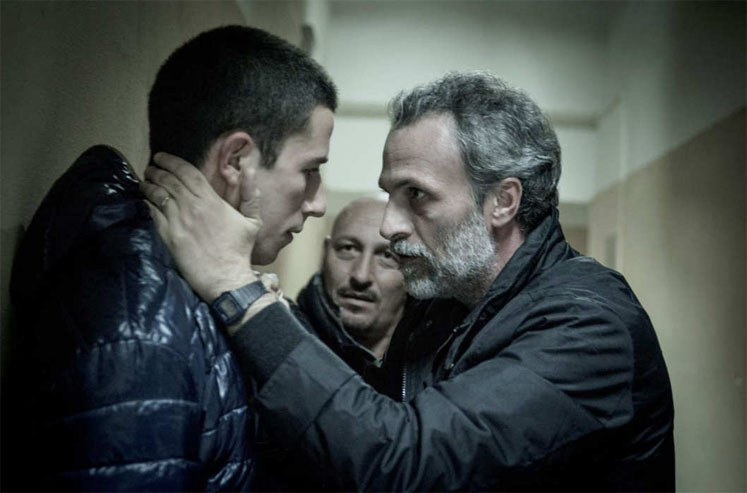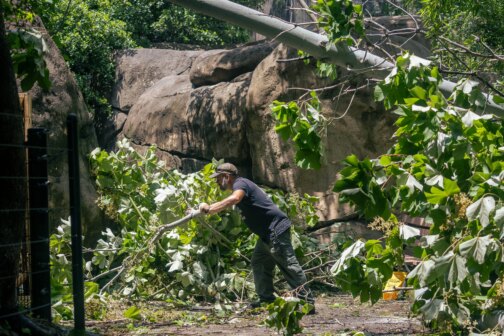Francesco Munzi’s Black Souls opens in the canals of Amsterdam, a modernized, northern European city that, by the film’s end, feels a world away from the subterfuge of clan dynamics that fuels the film’s exploration of fraternal love and betrayal.
Two drug dealing bothers are in the Dutch city arranging a shipment of cocaine to Milan, which they then smuggle across the Italian boarder in pineapples. After the job is done, they take a surprising detour to a farm where they steal a goat, skin it, gut it, and roast it in a warehouse behind a strip club. You can take the man off the goat farm, the scene seems to be trying to say, but you can’t take the goat farmer out of the man.
The brothers are two of three sons of a goat herder from Calabria, a southern region in Italy. After their father was killed – presumably as part of a Mafioso hit – the eldest stayed on the farm while the other two went on to make their ways in the dark doings of the world. It is this essential dichotomy between parochial life of the farmer and the glamourous life of Milan, drugs, and business that sets up the film’s dramatic conflict.
The allure of the wider world, represented here by the greed, glamour and machismo pride of the drug trade, tugs at the member of the next generation, Leo (Giuseppe Fumo) who leaves the farm to join his uncle in Milan but not before he shoots up a local café in retaliation for a familial insult. Leo is ambitious, but hot headed, and it will get him in trouble. It turns out he shot-up the wrong café, angering a local mob boss. After he arrives in Milan, news of his little pop-shot escapade follows him close behind, and the two brothers are dragged back into the undercurrent of their dysfunctional home town’s local politics. They are forced to return home to sort it all out.
Black Souls feels like a film being pulled into two directions. On the one hand, the conventions of its gangster melodrama leads the plot into familiar story twists and narrative conventions. There are the usual veiled insults, cloaked insinuations, street hits, and webs of competing influence. And there are Sopranos-like scenes of the brothers and their extended family of confidants sitting around long tables, drinking wine, debating their next move to position their operation and the family within the power struggling local hoods.
But Munzi is an ambitious and talented filmmaker, and he wants to use his gangster story as a way to make something that resonates more profoundly, something along the lines of a Greek tragedy. In this way, Black Souls is about the unraveling of a family, the undoing of a house, tracing-out the way inherited guilt shapes the dynamic context of each character’s individual existence, with each generation working to undo – or destined to repeat – the sins of the previous one.
As the title suggests, the film itself is dark. It is shot in a somewhat muted, high-contrast style that allows crevasses in the landscape to disappear into black, and shadows and silhouettes to resonate with nourish texture. Settings are important. The decrepit ruins of the hilltop town contrast greatly with modernized Milan and Amsterdam, suggesting a reality of a primordial Europe still working its influence beneath the surface of the polished, contemporary continent. Then there is the stratified farm house, with its family rooms bustling with women, and its stark lower basement where the men retreat to scheme. And while the film can occasionally feel slow, and perhaps overly ponderous, Munzi is quite good building tension, using suggestive cut-aways and the peripherals of his frames to shock and surprise us.
The most compelling drama belongs to the father and son duo of Luciano and Leo. In the noble, seemingly simple goat herder Luciano, we feel the weight and stress of his attempt to break generational miasma, the cycle of violence and slipping into vice that has seemingly haunted his family for generations. In Leo we feel the familiar angst of youth striving to distinguish itself, grasping for its own sense of purpose and place in a world in which that all-too-identifiable effort only leads him into destructive territory.
This all leads the slow-burning film towards a sudden, explosive conclusion, with the last ten minutes of the film shimmering with an rare energy and vigor. Unfortunately, that leaves you both admirable of Munzi’s effort and wishing a bit of the dynamism of the conclusion had infected more of the rest of the film.





